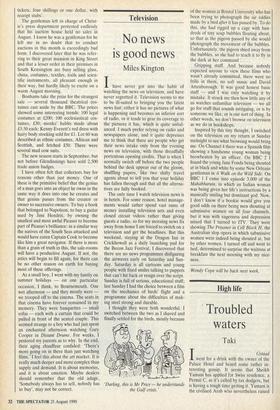Television
No news is good news
Miles Kington
Ihave never got into the habit of watching the news on television, and have never regretted it. Television seems to me to be ill-suited to bringing you the latest news fast; either it has no pictures of what is happening and becomes an inferior sort of radio, or it tends to gear its coverage to the pictures it has, which is quite unbal- anced. I much prefer relying on radio and newspapers alone, and it quite depresses me to think that there are people who get their news intake only from the evening news on television, with those dreadfully portentous opening credits. That is when I normally switch off before the two people behind the desk appear out of the gloom, shuffling papers, like two shifty travel agents about to tell you that your holiday has fallen through and that all the alterna- tives are fully booked.
The only time I watch television news is in hotels. For some reason, hotel manage- ments would rather spend vast sums of money installing television sets and even closed circuit videos rather than giving guests a radio, so for my morning news fix away from home I am forced to switch on a television and get the headlines. But this weekend, staying at the Dragon Inn in Crickhowell as a daily launching pad for the Becon Jazz Festival, I discovered that there are no news programmes disfiguring the airwaves early on Saturday and Sun- day. Saturday is all cartoons and young people with fixed smiles talking to puppets that can't hit back or resign over the script.
Sunday is full of serious, educational stuff; last Sunday I had the choice between a film on the mechanics of birds' flight and a programme about the difficulties of mak- ing steel strong and durable.
I thought they were both wonderful. I switched between the two as I shaved and finally settled for the birds, mostly because 'Darling, this is Mr Price — he understands the Gulf crisis.' of the woman at Bristol University.who has been trying to photograph the air eddies made by a bird after it has passed by. To do this, she had rigged up a cage with hun- dreds of tiny soap bubbles floating about, so that as the pigeon passed by she would photograph the movement of the bubbles. Unfortunately, the pigeon shied away from the bubbles, so she had to teach it to fly in the dark at her command . . . .
Gripping stuff. And because nobody expected anyone to view these films who wasn't already committed, there were no frills in them, no soft music and David Attenborough. It was good honest basic stuff — and I was only watching it by mistake. It struck me then how little any of us watches unfamiliar television — we all go for stuff that sounds intriguing, or is by someone we like, or is our sort of thing. In other words, we don't browse on television as we do in bookshops.
Inspired by this tiny thought, I switched on the television on my return at Sunday midnight to see what browsing would bring me. On Channel 4 there was a Spanish film showing a handsome young woman being browbeaten by an officer. On BBC 2 I found the young Jane Fonda being shouted at in black and white by some New Orleans gentleman in A Walk on the Wild Side. On BBC 1 I came into episode 3,000 of the Mahabharata, in which an Indian woman was being given her life's instructions by a manically smiling but dominant god. Now, I don't know if a bookie would give you good odds on there being men shouting at submissive women on all four channels, but it was with eagerness and depression mixed that I turned to ITV. They were showing The Prisoner in Cell Block H, the Australian slop opera in which submissive women were indeed being shouted at, but by other women. I turned off and went to bed, determined to surprise the waitress at breakfast the next morning with my nice- ness.










































 Previous page
Previous page